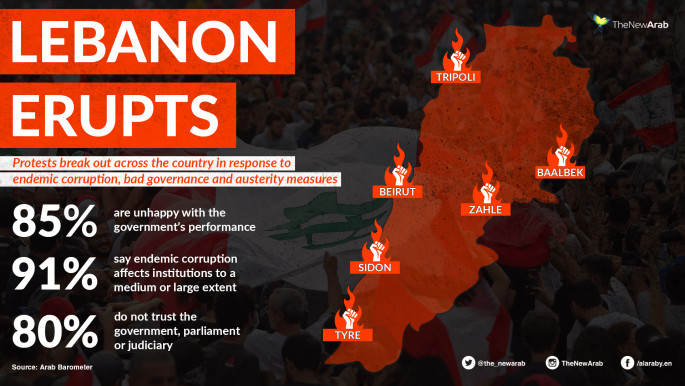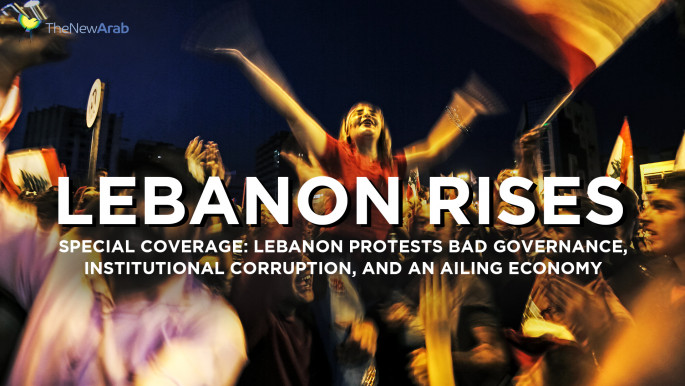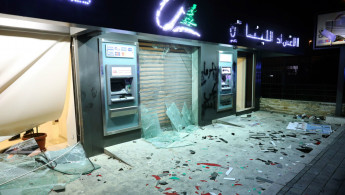Three months after Lebanon's uprising began, protesters are radicalising and targeting politically connected banks
The marked escalation of the uprising's tactics saw a "Week of Wrath" being declared, this time targeting more explicitly Lebanon's banks - the financial institutions many protesters hold responsible for the country's current economic crisis.
Protesters on Tuesday and Wednesday fixated their ire on a key banking district in the capital Beirut, targeting the headquarters of Lebanon's central bank (BDL) in the prestigious Hamra neighbourhood.
Report and videos flooding social media showed furious protesters attacking the windows of commercial banks and destroying ATM machines with metal bars, bricks and fire extinguishers, leaving banking premises across the capital shattered in a message of extreme anger.
After three months of popular protests that have produced no tangible change amid total indifference by the dominant political forces, activists on the ground say they are justified in channelling their anger at the banking system they accuse of collusion in high-level corruption and mismanagement.
| |
Even compared to the global banking system, Lebanon's banks stand out for having a particularly intimate relationship with the country's ruling class and the super rich.
"Banks here are very much intertwined with the political class," Hussein El Achi, Lebanese activist and lawyer at the Beirut Bar Association, told The New Arab.
"Politicians are either shareholders in these banks, both directly or indirectly through third parties, or occupy seats on the bank boards - (receiving) very high remuneration."
With the entwining of the banking and political class an endemic feature of Lebanon's political system, protesters are especially angered at the bank's alleged role in facilitating corruption.
"Banks in Lebanon are the biggest state lender," said El Achi. "All those suspicious dealings and the corrupt projects you see... are all financed by these banks. Everyone sees that the banks are complicit in state corruption."
Twitter Post
|
Deposits 'held hostage'
Informal capital control imposed by the banks due to the recent liquidity crunch meant withholding customer deposits, pouring fuel on the flames of public fury.
Since September 2019, Lebanon's banks have imposed increasingly tight restrictions on dollar withdrawals and transfers abroad. Although no formal policy is in place, most banks have limited cash withdrawals to around $1,000 a month, while others have slowly imposed even tighter curbs.
Banks claim these measures are critical to conserve dwindling foreign currency reserves amid a US dollar liquidity crisis.
Activists say ordinary depositors are now footing the bill for a liquidity crisis caused by the elite, many of whom may have smuggled billions of dollars out of the country before and during the crisis: Protesters say the country's politicians, top bureaucrats and bank owners have themselves been able to leverage their influence to move substantial dollar savings into Swiss accounts.
"At first, people went into their local banks asking for their money from their bank accounts, and the bankers would tell them you can only get a certain amount a day, which began as $200 (per week)," El Achi told The New Arab.
"Gradually, this turned to 'you can only get your money in Lebanese pounds', and people were still okay with that, they would take their money and leave."
Read also: Lebanon's Ponzi scheme economy is broken. Protesters want the wealthy 1% to foot the bill
"There were groups who invented very creative songs shaming the banks and would go from branch to branch just singing these songs," El Achi says.As news of the restrictions spread in the final months of 2019, protestors began rallying at different banks across the country calling for their rights to access their accounts.
As the situation worsened, with no apparent end in sight, customers and citizens across the country became increasingly agitated as access to their money was withheld.
"As informal capital control intensified, people became angrier. We saw people shouting, we saw people sometimes standing there and refusing to leave the branch, and calling for support from other people, so they can get their money," El Achi says.
"Some groups even volunteered to come help people get their money from the banks, by just staying there and shouting and screaming," he adds.
"Others resorted to very creative measures, like blocking the doors of the banks with their trucks and their cars. And some eventually succeeded in getting their money."
 |
| Click here to enlarge |
The 'Week of Wrath' protests
Over the past month, activits said the banks themselves have used draconian measures and even violence to deny customer claims.
"Banks started to use private security and Internal Security Forces against clients who refused to leave the premises," El Achi says, in reference to the national police force, which was forced to apologise on Thursday following evidence of police brutality against protests.
"On numerous occasions, customers were attacked and assaulted inside the banks. Some of them were even locked up in small offices and got their phones confiscated, which is illegal, of course".
Wednesday's protests saw new levels of violence by members of what has been a largely peaceful movement. Aside from the smashing of shop-fronts and ATMs, attacks included starting fires outside the country's Association of Banks, the body that represents bank owners. The protests saw at least 100 people arrested – most of whom were released on Thursday.
Twitter Post
|
But the activists claim that the violence itself was highly directed and focussed against the banks alone.
"Protesters only attacked the banks," El Achi tells The New Arab. "They did not attack any other shops or nearby smaller vendors. They only attacked bank branches, and that was it.
"The shopfront of stores just next to the banks that have had their windows smashed were completely intact. Some even had the soda refrigerators outside, which could have been damaged or stolen or taken, but they were perfectly intact. Protesters just wanted to target the banks and nothing else."
In the aftermath of the violence in the Hamra, activists are now urging those within Lebanon's banking system to work with them to expose the illicit financial practises plaguing the country's economy.
"Bank employees are part of our society, and they are one of us. We live the same struggles on a daily basis," El Achi explained.
"More importantly, we need their help. They have access to very valuable information about corruption, about the stifling of money and about illicit transfers. We need this information," he said.
"They can talk to people they trust; they can talk to reporters who are also trusted with these matters. This information needs to come out, so we can hold people accountable."
Yet through the transfer of damage to their customers, the banks themselves may have caused an unfixable rift between them and Lebanon's public.
"The scar is big and it runs deep," El Achi says. "If people are ever going to have faith or have trust in this banking sector again, a lot needs to be changed, and not just in the banking sector but the whole system has to radically change.
"Even if that happens, it will take us a really long time to recover from this and have trust again."
Sarah Khalil is a journalist at The New Arab.
Follow her on Twitter: @skhalil1984
The New Arab is covering the protests day by day, offering news updates, analysis, commentary and much more. Click on Special Contents page below and follow this regularly updated section for the latest on Lebanon's uprising:
 |
|
Follow us on Twitter and Instagram to stay connected



